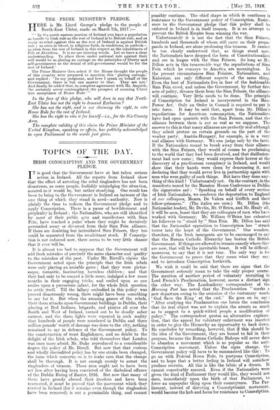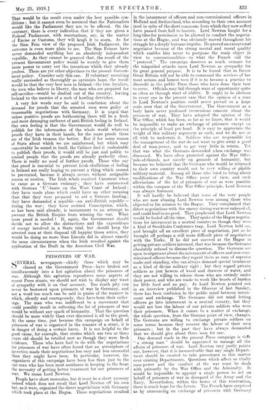TOPICS OF THE DAY.
IRISH CONSCRIPTION AND THE GOVERNMENT PLEDGE.
IT is good that the Government have at last taken serious action in Ireland. All tho reports from Ireland show that the effect of arresting the rebel ringleaders has not been disastrous, as some people, foolishly misjudging the situation, assured us it would be, but rather steadying. One result has been to bring to the Go vernment in Ireland an increase of the one thing of which they stand in need—authority. Now is plainly the time to redeem the Government pledge and to apply Conscription. There is a pause of bewilderment and perplexity in Ireland ; the Nationalists, who are still identified by most of their public acts and manifestoes with Sinn Fein, have reached a point where they might be decisively persuaded away or divorced from their Sinn Fein alliance. If there are doubting but intimidated Sinn Feiners, they too could be separated from the recalcitrant stock. If Conscrip- tion is not enforced now, there seems to be very little chance that it ever will be.
It is almost too bad to suppose that the Government will add fresh mistakes of precisely the same character and quality to the mistakes of the past. Under Mr. Birrell's regime the Government acted upon the principle that the Irish rebels were only playing an amiable game ; that they were pictur- esque, romantic, fascinating, harmless children ; and that they had only to be coaxed a little more, indulged a few more months in their engaging tricks, and smiled upon as one smiles upon a precocious infant, for the whole Irish question to settle itself. Till the fallacy embodied in this policy was proved disastrously wrong, there might have been something to say for it. But when the amusing games of the rebels, their sham attacks upon Government buildings in Dublin, their playing at Red Indians, brigands, and pirates all over the South and West of Ireland, turned out to be deadly sober earnest, and the sham fights were repeated in such reality that hundreds of people were murdered in Dublin and three million pounds' worth of damage was done to the city, nothing remained to say in defence of the Government policy. To the consternation of most Englishmen, and no doubt to the delight of the Irish rebels, who told themselves that London was once more afraid, Mr. Duke reproduced to a considerable degree the policy of Mr. Birrell. But now that that curious and wholly discredited policy has by one stroke been changed, the issue which concerns us is to make sure that the change shall be thorough. It is not enough merely to arrest the ringleaders of treason. These men ought not to have been set free after having been convicted of the diabolical offence of the Dublin Rising of Easter, 1916. But now that many of them have grossly abused their freedom and have been rearrested, it must be proved that the movement which they started in Ireland (for it remains even though the ringleaders have been removed) is not a permissible thing, and cannot possibly continue. The chief shape in which -it continues is resistance to the Government policy of Conscription. Resist- ance to the Government pledge that this policy shall be enforced in Ireland is in itself treason. It is an attempt to prevent the British Empire from winning the war. Unfortunately it is not the fact that the Sinn Feiners, hundreds and thousands of whom still carry on their propa- ganda in Ireland, are alone professing this treason. It cannot be too clearly understood that, as things stand now, the Nationalists have dropped the form of Constitutionalism and are in league with the Sinn Feiners. So long as Mr. Dillon acts in this treasonable way the repudiations of Shin Fein which he conveys to America are meaningless. In the present circumstances Sinn Feinism, Nationalism, and Kaiserism are only different aspects" of the same thing. Even the best of Nationalists live in fear of the fashionable Sinn Fein creed, and unless the Government, by further firm acts of policy, divorce them from the Sinn Felners, the affiance will continue. Very little needs to be done. The principle of Conscription for Ireland is incorporated in the Man- Power Act. Only an Order in Council is required to put it into force. It may be said that, apart from Mr. Dillon's repudiations for American consumption, the Nationalists have had open quarrels with the Sinn Feiners, and that the alliance between them is not as real as we suppose. The answer to this is that many affiances are perfectly real although they admit protest on certain grounds on the part of the weaker party. Austria-Hungary, for example, is in a very real alliance with Germany. We can judge only by the facts. If the Nationalists meant to break away from their alliance with the Sinn Feiners, they would of course be proclaiming to the world that they had been deceived, and that disillusion- ment had now come ; they would express their horror at the discovery of a pro-German conspiracy in Ireland, and would show that their -hands were clean by denouncing it, and declaring that they would never live in partnership again with men who were guilty of such things. But have they done any- thing of this kind ? Unfortunately not. On the contrary, in the manifesto issued by the Mansion House Conference in Dublin the signatories say : " Speaking on behalf of every section of Irish Nationalists, we condemn the deportation to England of our colleagues, Messrs. De Valera and Griffith and their fellow-prisoners." (The italics are ours.) Mr. Dillon (the Nationalist leader), Mr. Devlin, Mr. O'Brien, and Mr. Healy all, it will be seen, boast that they are colleagues of men who have worked with Germany. Mr. William O'Brien has exhorted his followers to " stand by " Sinn Fein. Mr. Dillon has said that the Nationalist opposition to Conscription has " struck terror into the heart of the Government." One wonders, therefore, if the Irish insurgents are to be encouraged to say that the Roman Catholic Hierarchy has beaten the British Government. If things are allowed to remain exactly where they are now, that will be the inevitable boast. It will be difficult, moreover, to say that it is not true. The only way is for the Government to prove that they mean what they say, and to introduce Conscription forthwith.
We wish it could be said that there are signs that the Government seriously mean to take the only proper course. The mention of another period of voluntary recruiting in Lord French's Proclamation, however, seems a distinct sign the other way. The Londonderry correspondent of the Morning Post has noted that the Proclamation " marks a new departure owing to the omission of the customary words God Save the King ' at the end." He goes on to say : " After studying the Proclamation one forms the conclusion that its real object was not to explain the arrests so much as to suggest to a quick-witted people a modification of policy." The correspondent quotes an alternative explana- tion, that the appeal for voluntary enlistment was inserted in .order to give the Hierarchy an opportunity to back down. He concludes by remarking, however, that if this should be the idea of the Government, they are bound to fail in their purpose, because the Roman Catholic Bishops will never dare to abandon a movement which is so popular as the anti- Conscription movement. Unless the signs change, the Government policy will have to be summarized like this : To go on with Federal Home Rule, to postpone Conscription, and to hope that a better feeling in Ireland will somehow produce recruits. All this is like the fabric of a dream. It cannot conceivably succeed. Even if the Nationalists were given the kind of Parliament they would like, they would not dare, immediately upon the birth of that Parliament, to force an unpopular thing upon their countrymen. The Par- liament, instead of directing a Conscriptionist movemnt, would become the hub and focus for 'resistance to Conscription. That would be the result even under the best possible con- ditions • but it cannot even be assumed that the Nationalists would like the Parliament they are to be offered. On the contrary, there is every indication that if they are given a Federal Parliament, with reservations, say, in the matter of Excise or Customs, they will laugh it to scorn. As for the Sinn Fein view of the proposed Irish Parliament, the outcome is even more plain to see. The Sinn Feiners have never demanded anything but an absolutely independent republic. As they cannot be granted that, the result of the present Government policy would be merely to give them more power to carry out the intentions which they already profess. There are yet other objections to the present Govern- ment policy. Consider only this one. If voluntary recruiting really succeeded as thoroughly as optimists hope, the result would be that the very best men in Ireland—the true loyalists, the men who believe in liberty, the men who are prepared for self-sacrifice—would be drafted out of the country, leaving Ireland to the mercies of a mob of howling dervishes.
A very feiv words may be said in conclusion about the demand for proofs that the arrested men were guilty of treasonable negotiations with Germany. It is urged that unless positive proofs are forthcoming there will be a fresh and most damaging outburst of anti-British feeling in Ireland. Our own feeling is that the Government would do well to publish for the information of the whole world whatever proofs they have in their hands, for the more proofs there are of the Irish treason the better. But if for some reason of State about which we are uninformed, but which may conceivably be sound in itself, the Cabinet find it undesirable to publish their proofs, it would still be just and politic to remind people that the proofs are already perfectly clear. There is really no need of further proofs. Those who say that proof is essential to prevent fresh ebullitions of feeling in Ireland are really hoping to prevent a thing which cannot be prevented, because it always occurs without assignable reason or motive. The Irish rebels received Casement when he came as a German emissary ; they have commerced with Gernian '-boats on the West Coast of Ireland ; they have made plans which could have no other meaning than that they were prepared to aid a German landing ; they have demanded a republic—an anti-British republic— during the war ; they have resisted Conscription, which, as has been said already, is tantamount to an attempt to prevent the British Empire from winning the war. What more proof is needed ? If, again, the Government should decide not to allow the distractions and the expenditure of energy involved in a State trial, but should keep the arrested men at their disposal till happier times arrive, they would be doing no more than Lincoln did in almost exactly the same circumstances when the Irish revolted against the application of the Draft in the American Civil War.



























 Previous page
Previous page